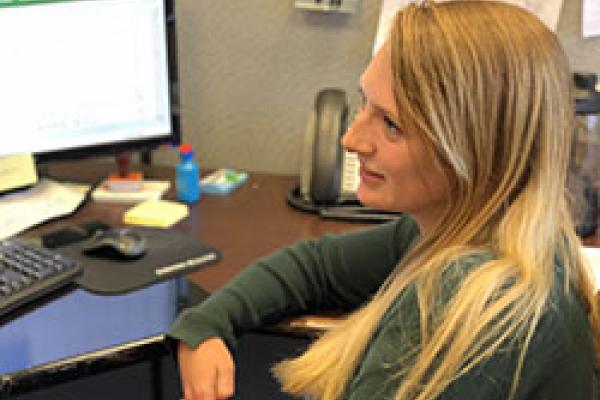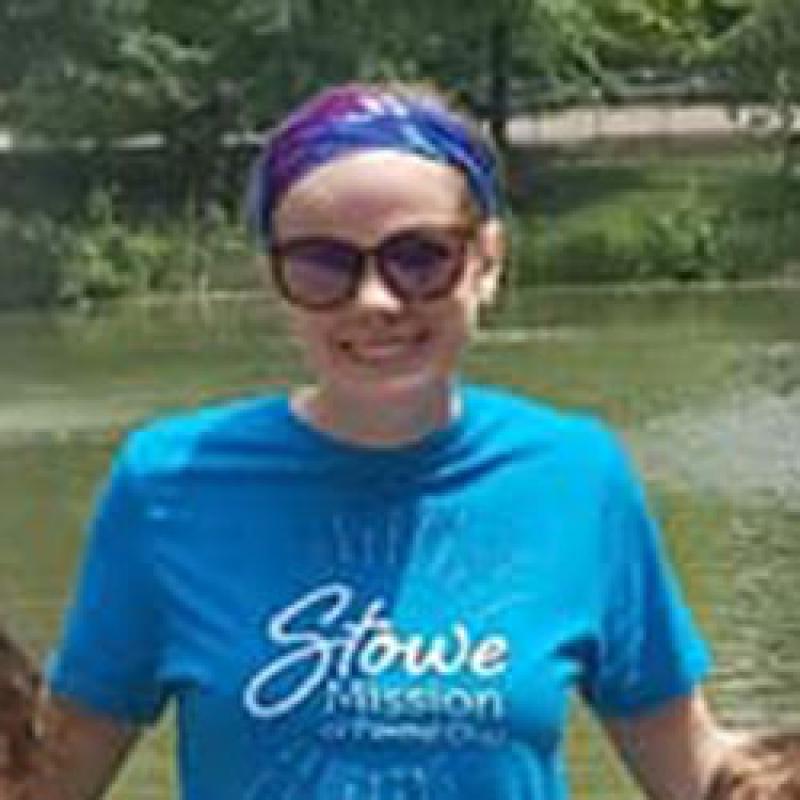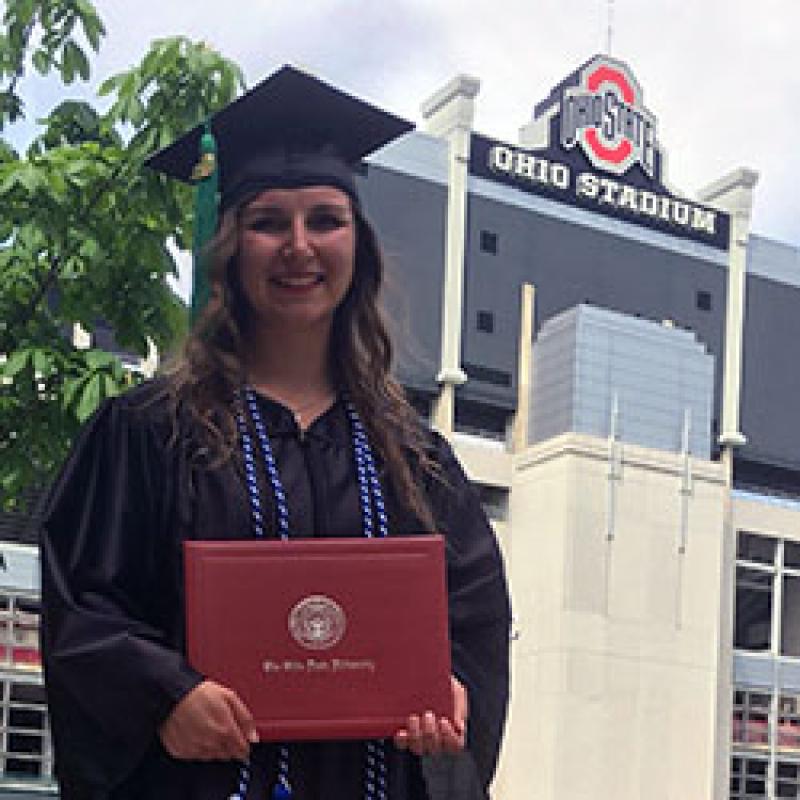Work Hard, Play Hard: TBDBITL students remain in band after getting full-time jobs

Like millions of Americans, Lindsay Hostetler starts her day early in the morning and goes to work at her full-time job.
Unlike those millions of Americans, Hostetler finishes her work day and heads straight to the Ohio State University Marching Band for rehearsal.
A fifth-year sousaphone player and a squad leader, Hostetler is one of a handful of marching band members who have full-time jobs that take up most of their days. Through Ohio State’s Extended Education program, students who have already graduated have the opportunity to play in the marching band.
Marching band students get five years to participate, and when Hostetler graduated in spring 2018, she had only marched for three. With Extended Education and a flexible work schedule, she’s able to make time for the band she loves while putting her Ohio State degree to good use in Columbus.
While earning her degree in geographic information systems, Hostetler got an internship at the Franklin County engineer’s office. That blossomed into a full-time job after her graduation and a position where her employers allowed her to leave every day with time to get to band rehearsal at 4:10 p.m. She takes public transportation between work and the band, sometimes using her bus time to listen to music she needs to rehearse.
The ability to participate in marching band while working a full-time job also enabled her to dot the i in Script Ohio, the highest honor for a sousaphone player. Reserved only for fourth- and fifth-year sousaphone players, dotting the i would not have been a possibility for Hostetler if she left the band after graduation.
Instead, she came back for a fourth and fifth year and got to experience the thrill of 100,000 people at Ohio Stadium focused solely on her.
“At what other time in my life am I going to be able to perform in front of so many people?” Hostetler said. “Sometimes I can’t believe it. It’s an adrenaline rush.”
Adam Throckmorton | A Row, Trumpet
Health Information and Management Systems
Data Analytic Specialist, The James Cancer Hospital
Adam Throckmorton works hard to make nurses’ scheduling more efficient. From 7 a.m. to 3:30 p.m. most weekdays, he spends his time building visualizations or analyzing data to help with productivity and decision making at The James Cancer Hospital.
Even with all of that going through his head, Throckmorton comes to band rehearsal every weekday ready to play music. A fourth-year member of the marching band last year, he had one more year of eligibility remaining as he entered the working world. He finished his degree in health information and management systems and quickly found employment at The James.
Luckily, his employer didn’t have a problem with him remaining in the marching band. In fact, they brought it up on his job interview, asking what his potential conflicts would be.
“I told them my priorities lie with this job and not with the band,” Throckmorton said. “This job comes first because it’s my career, and the band is something that is extracurricular.”
He told them what the hours would be. Their response? Not bad at all.
So Throckmorton has been making it work all year. He hustles from The James to Ohio Stadium most weekdays, arriving shortly before rehearsal begins. He’s been late to band practice just once because of a work conflict, but the band directors and squad leaders have been understanding.
Things get stressful for Throckmorton sometimes — working in the daytime for eight hours and then coming to the band center for another three — but he gets little reminders from time to time of how special his situation is and how lucky he is to have Extended Education as an option.
“I would say I’m really grateful, even though all the stress and whatnot has been quite a trip,” Throckmorton said. “Just the other day, one person at work was like, ‘My gosh! You’re in the band?’ It was just a reminder of how highly people think of this organization.”
Sarah Stewart | R Row, Mellophone
Public Affairs, minor in Nonprofit Management
After-School Program Coordinator/Marketing Coordinator

A stellar clarinet player who was the Wayne High School drum major and Bandmember of the Year as a senior, she put music aside upon arrival at Ohio State in fall 2015. She put away her clarinet and didn’t touch it for two years.
But during her junior year, music started calling her back. With no experience playing a brass instrument, Stewart decided to order a mellophone instructional book off Amazon and rent a mellophone from a website. She got half an hour of mellophone lessons per week from a private instructor but was otherwise completely on her own in learning a new instrument.
After a year of training, she tried out for marching band before her senior year and made the cut. She graduated with her degree in public affairs last spring with four years of band eligibility remaining.
“After I made band, about halfway through the season I realized I loved it so much and didn’t want to be done yet,” Stewart said.
While working on her degree, Stewart served as an intern for two years with Stowe Mission, a local nonprofit that runs community-oriented programs including food banks, tutoring and religious outreach. After graduation, Stowe Mission hired her full time to direct its after-school program where she creates curricula, coordinates volunteers and works on other administrative tasks.
Unlike Throckmorton and Hostetler, Stewart is working full time while still a relative newcomer to the band. In just her second year of marching, she’s still new enough that alternates will frequently challenge her for her spot. That means she has to spend extra time perfecting her music each week.
A typical day for her during the fall includes working a full shift during the daytime, rehearsing for three hours with the band and then staying at the stadium to practice her music for the week until around 9:30 p.m. She heads home, goes to sleep and does it all over again.
Compared to her first year with the band in 2018, this season has brought a different kind of stress. But she loves making an impact in the community with Stowe Mission, and she’s open to returning to marching band for a third year and beyond.
“It’s a different game than it used to be, but I love band and I love being here, so it’s worth the stressful weeks,” Stewart said.
Haley Rohaley | R Row, Mellophone
Respiratory Therapy
Registered respiratory therapist, Wexner Medical Center East

With a little more detail, you get the picture of what a respiratory therapist does. She assesses patients with pulmonary issues and treats them in basic floor therapy to help them heal. When in the intensive care unit, she manages patients on ventilators and even performs CPR to save lives on occasion.
And after all that, she’ll head right over to Ohio Stadium for band practice. After potentially stressful days where people’s lives may be on the line, even a difficult day at band rehearsal can be calming.
“When I do have stressful days, I’ll tell [fellow bandmembers], and they’ll definitely make me feel better,” Rohaley said. “And I love to do band, so being able to sit in the rehearsal hall and play music really relaxes me.”
Rohaley did not make the marching band during her first two years while working on her degree in respiratory therapy, but she earned a spot during her final three.
After graduating in spring 2018, she’s now using Extended Education for the second consecutive year to remain in the band and use up her eligibility.
“I’m so thankful because I’m able to get the full five-year experience,” Rohaley said. “If I had to stop when I graduated, I would have gotten a lot less time doing my favorite thing.”
